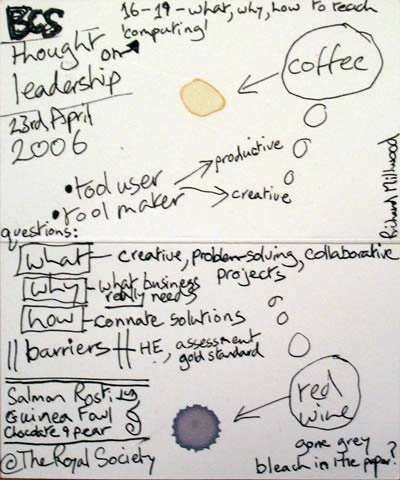Computing/IT as a subject for 16-19 year olds: What should we be teaching? Why? How? What are the barriers to success?
-
"There is a lot of debate at the moment about the content of IT/ICT/IS/Computing for 16-19 year olds. The focus of consideration recently has been in the teaching of ICT embedded within the curriculum, followed by the importance of a choice for pupils of the subject of IT/Computing at GCSE level and then 16-19 level."
-
"But research shows that many pupils aged 14 or so regard ICT/Computing as akin to a typing skill. Often ICT/Computing comes over as a boring subject as many teachers find it hard to keep up and to make their subject exciting. The image of a job in the profession of IT does not capture pupils’ imaginations and has little street cred. The numbers of pupils entering colleges and universities to study the subject is seriously below the nation’s requirements.
-
"What exactly are we trying to achieve in the courses for 16-19 year olds, is the present set appropriate and what kinds of courses should they be offered? What would the universities like to see? What is E-skills UK planning to provide?"
I was invited to this British Computer Society 'Thought Leadership' event last night at the Royal Society in London. My notes made on the back of my name card represent my response.
-
•What: a focus on creativity, problem solving, collaboration through projects;
-
•Why: this is what business and society really need;
-
•How: a connate solution - I am indebted to my colleague Malcolm Moss for the term 'connate'. You could link it with 'cognate', but I prefer to think of it as 'joined at birth', metaphorically meaning that the solution to this problem is born of joined-up thinking. This means addressing teacher continuing professional development, curriculum development, assessment innovation and pedagogic clarity from the outset and together;
-
•Barriers: higher education's subject silos and focus on individual endeavour, our false belief in the 'gold standard' examination as our means of summative assessment.
Another concern I have is that computer science (and education) has failed the learner of programming - hardly any serious advances in programming environments tuned to learning since Papert and little basic research into children's understanding of programming since the same era - 25 years ago.
All this on the same day that my PhD student, Nili Naveh from Israel has her qualification confirmed. Her subject? - Algorithmic Thinking.
I am looking forward to a fertile decade - real need, excellent starting point!
Ricardo’s Blagado
Tuesday, 25 April 2006

